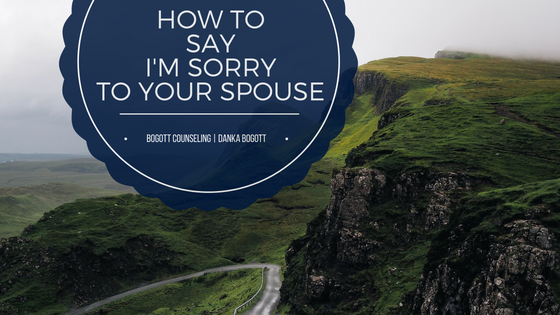
There’s lots of advice out there on how to give an apology that has lasting impact: an apology that results in a restored relationship.
Whether the process requires four steps, or eight steps, one of the things that rings most true to me is the need to own your responsibility for the injury you caused the other person.
In preparation for an upcoming Marriage Retreat, I recently watched this clip from a fellow Marriage & Family counselor based in Utah.
The five steps Julie outlines provide an excellent framework for apologizing.
I don’t know about you, but when I look at this list, the one that really sticks in the throat is right there on the top of the list:
own. your. part.
I couldn’t agree more — all good apologies must include owning your part, but the big question we so often face is this:
HOW? How do you do that?
How do you say “I’m sorry, I know that I did [fill in the blank – AKA – that cruddy thing you did]” and leave it at that?
Is it even realistic not to discuss the reasons for your actions?
It seems to me that there are two aspects to owning our part that we need to see clearly in order to be able to do just that — own our part.
If we don’t start with owning our part, we cannot accurately show the person that we understand the way it’s hurt them.
If we don’t own our part then we won’t be able to show empathy.
And so it goes for each step in the process of reconciliation.
Part of what we need to do is reckon with the fact that an apology is about reconciling and NOT about being understood.
This willingness to put the other person first and help them feel understood is at the heart of an apology that will be well-received by the person you’ve hurt.
Not only should “being understood” be saved for another conversation but frequently the need to feel understood evaporates with reconciliation — highlighting the fact that sometimes our “need” to be understood is more about defending ourselves in a moment of conflict than about actually experiencing fundamental misunderstanding.
Every apology needs to move from owning our part to full reconciliation, but today — take some time to think about that person (you know who) with whom you recently had conflict.
Imagine what it would look like to acknowledge your part and leave it at that.
Period.
It might just be the beginning of a wonderful new relationship.